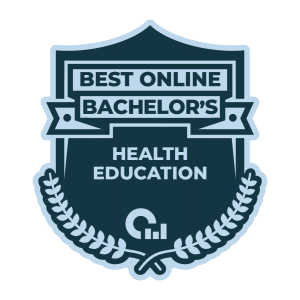Saves lives by being at the forefront of educating the public on health concerns with the 5 Best Online Bachelor’s in Health Education.

We often praise doctors as educators of illness and health concerns, but doctors typically only treat one person at a time, limiting the number of people they can influence. Meanwhile, health educators are able to reach and educate large groups of people at once. This is a big responsibility that, when done right, will leave you feeling like you made the world a better place!
What Is an Online Bachelor’s in Health Education?
An online bachelor’s in health education will teach you how to both recognize emerging public health issues, and how to educate the public on how to avoid and treat them. Your coursework will teach you how to trace diseases to their origin and show you proven methods for preventing and treating outbreaks.
With most of these degrees, there are general education courses typically taken in the first two years of the program. These courses teach students subjects like English composition, math, and other essential skills needed for success in any career you decide to pursue.
How Much Can You Earn With an Online Bachelor’s in Health Education?
Many individuals who finish their online bachelor’s in health education ultimately choose a career as a health educator. There are many different types of health educators that specialize in certain conditions, but the underlying job responsibility of these individuals is to educate the public about health and prevent future diseases through this education. Health educators can expect to take home $54,220 per year.
Additionally, you may want to consider a career as a training and development specialist or a social and human service assistant. Training and development specialists can expect to bring home around $60,870 annually while social and human service assistants earn around $33,750.
What Is Required to Attend an Online Bachelor’s in Health Education Program?
When applying to an online bachelor’s in health education, most schools will want to see high school or GED transcripts if you have just graduated. Some schools may also require their students to submit their SAT or ACT scores, but you should talk to an enrollment advisor as this may or may not be a requirement.
If you have taken college classes in the past or are transferring from another university, the school will want to see your official college transcripts from these institutions. Most schools require the submission of an application packet with a small application fee for the collection and review of your information.
What Are the Most Affordable Online Colleges?
OSR uses six data points: three school-wide and three program-specific. For school-wide, OSR uses student satisfaction, admission rates, and the number of programs the school offers online. For program-specific, OSR checks the median debt of graduates from that program, how many degrees are offered within that program’s umbrella department, and what percentage of students at that school graduated from that department.
The six statistics are displayed by each school. The sliding bar under each statistic represents how that school compares to other U.S. institutions. “Not reported” means a school did not release that information to the U.S. Department of Education. A more detailed description of the OSR process can be found on the methodology page.
Let’s take a look at the 5 Most Affordable Online Bachelors in Health Education!









